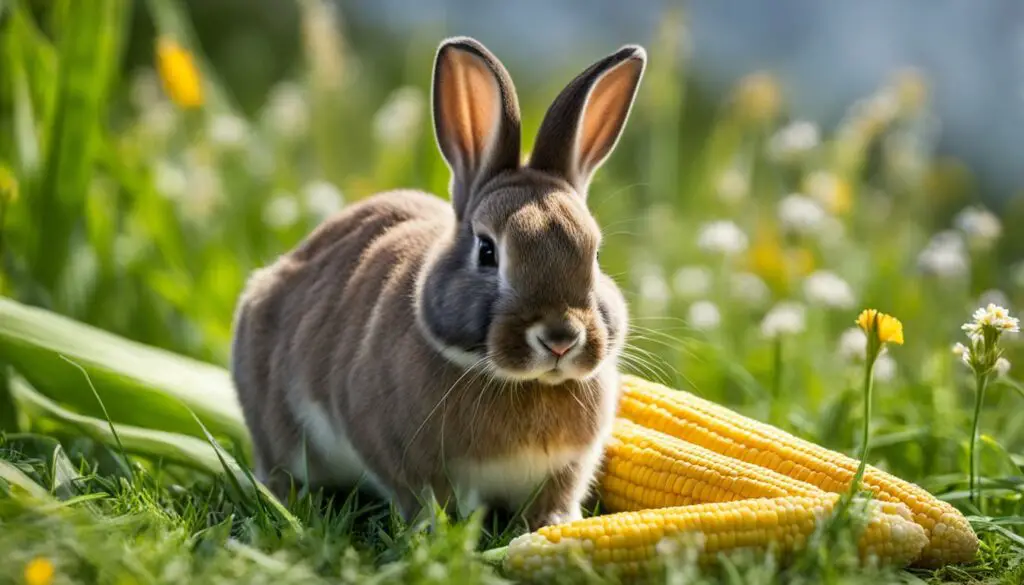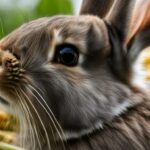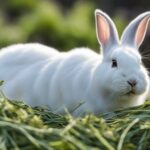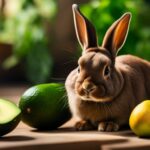As a rabbit owner, you may be wondering if it’s safe to feed corn to your furry friend. It’s important to understand that while corn is a common staple in our diets, it may not be suitable for rabbits. In this guide, I will provide you with all the information you need to make an informed decision about feeding corn to your bunnies.
Corn, although high in fiber and containing some vitamins and minerals, is not a nutritionally balanced food for rabbits. In fact, it can pose risks to their health. Rabbits have trouble digesting grains like corn, which can lead to digestive issues and even choking hazards. It’s essential to prioritize the well-being of your rabbits and opt for healthier alternatives.
Key Takeaways:
- Feeding corn to rabbits can lead to health risks such as choking hazards and digestive issues.
- Rabbits have difficulties digesting the hulls of corn kernels, which can cause intestinal blockages.
- Corn lacks the necessary nutrients rabbits require and has a high starch, potassium, and sugar content.
- It is best to avoid all corn products, including popcorn, when caring for rabbits.
- Instead, prioritize a balanced diet consisting of hay, fresh vegetables, fruits, and limited pellets for your rabbits’ optimal health.
Understanding Corn and Its Nutritional Value
When it comes to the nutritional value of corn, it’s important to understand that while it does contain fiber, vitamins, and minerals, it lacks the essential nutrients that rabbits need for a balanced diet. Corn, also known as maize, belongs to the grass family Gramineae and has a high starch, potassium, and sugar content. In comparison to other nutrients, corn has a relatively high potassium content. However, rabbits require a more diverse range of nutrients to maintain their health and wellbeing.
Feeding corn to rabbits can have detrimental effects on their health. The high fat and sugar content in corn can lead to obesity, diabetes, and dental problems in rabbits. Furthermore, the polysaccharide complex found in corn husks makes it difficult for rabbits to digest the hulls of corn kernels, potentially causing intestinal blockages. It’s important to prioritize the health of rabbits and opt for nutritionally balanced alternatives.
| Nutrient | Amount per 100g of Corn |
|---|---|
| Energy | 365 kcal |
| Protein | 9.4g |
| Fat | 4.7g |
| Carbohydrates | 74g |
| Fiber | 7.3g |
| Potassium | 287mg |
As seen in the nutrition chart, corn primarily provides energy through carbohydrates, with a relatively low protein and fat content. Rabbits require a diet that is high in fiber and low in starch and sugar. It’s essential to choose foods that are rich in the nutrients rabbits need for optimal health, such as fresh vegetables, hay, and limited amounts of high-quality pellets.
Why Corn is Not Suitable for Rabbits
When it comes to a rabbit’s diet, it’s important to understand what foods are safe and beneficial for their health. While corn may be a staple in our own diets, it is not suitable for rabbits. Feeding corn to rabbits can lead to a range of issues, from digestive problems to obesity. Let’s take a closer look at why corn is not a recommended food for rabbits.
One of the main reasons why corn is unsuitable for rabbits is their inability to properly digest it. Rabbits have a sensitive digestive system that is designed for a diet high in fiber, such as hay and fresh vegetables. Corn, on the other hand, is high in starch and lacks the necessary nutrients that rabbits need for optimal health. In addition, the hulls of corn kernels contain a complex polysaccharide that rabbits have difficulty digesting, which can lead to intestinal blockages and other digestive issues.
Furthermore, corn has a high sugar and potassium content, which can contribute to obesity and other health problems in rabbits. Obesity is a common issue among pet rabbits and can lead to a range of health complications, including joint pain, heart disease, and a decreased lifespan. The high sugar content in corn can also contribute to dental problems, as rabbits’ teeth are not designed to handle excessive amounts of sugar.
As responsible rabbit owners, it is important to prioritize the health and well-being of our furry friends. Instead of feeding corn, focus on providing a balanced diet that includes plenty of fresh hay, a variety of vegetables, and limited amounts of high-quality pellets. If you’re unsure about what foods are safe for your rabbit, consult with a veterinarian who specializes in rabbit care. By making informed choices about their diet, we can ensure that our rabbits lead happy and healthy lives.
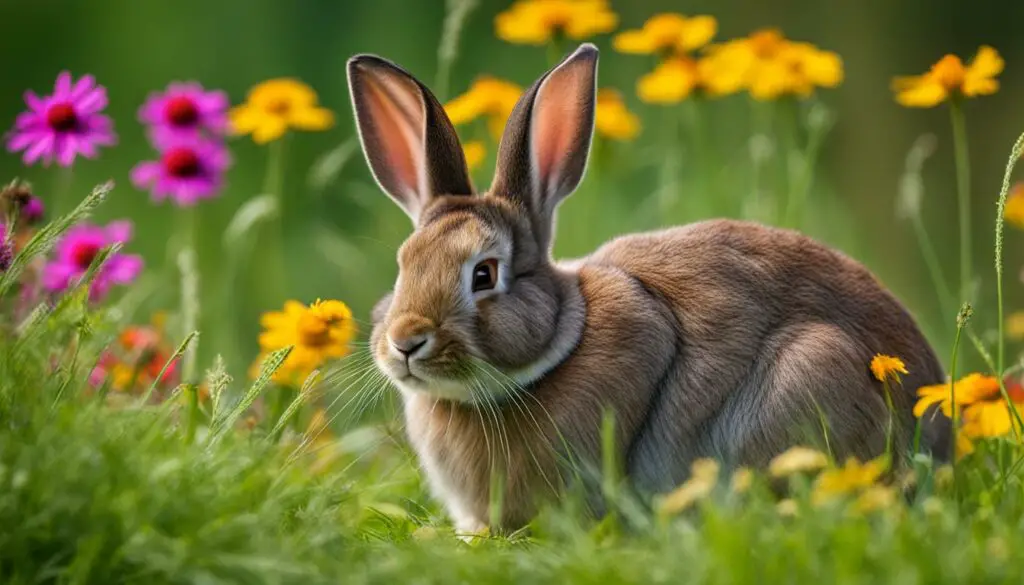
Popcorn and Rabbit Health
When it comes to feeding corn to domestic rabbits, it’s important to address the specific issue of popcorn. While popcorn is a popular snack for humans, it is not suitable for rabbits. Rabbits struggle to digest popcorn properly, and it often contains salts, sugar, and other ingredients that can be harmful to their health. Feeding rabbits popcorn can lead to digestive issues such as bloating and diarrhea, and it may also contribute to other health problems. Therefore, it is best to avoid giving popcorn to rabbits altogether.
It’s crucial to prioritize the well-being of rabbits and choose nutritionally balanced alternatives. While corn in its various forms may be tempting, it is not a suitable food for rabbits due to its high starch, fat, and sugar content. By providing rabbits with a diet consisting of hay, fresh vegetables, and limited pellets, you can ensure that they receive the necessary nutrients to maintain optimal health.
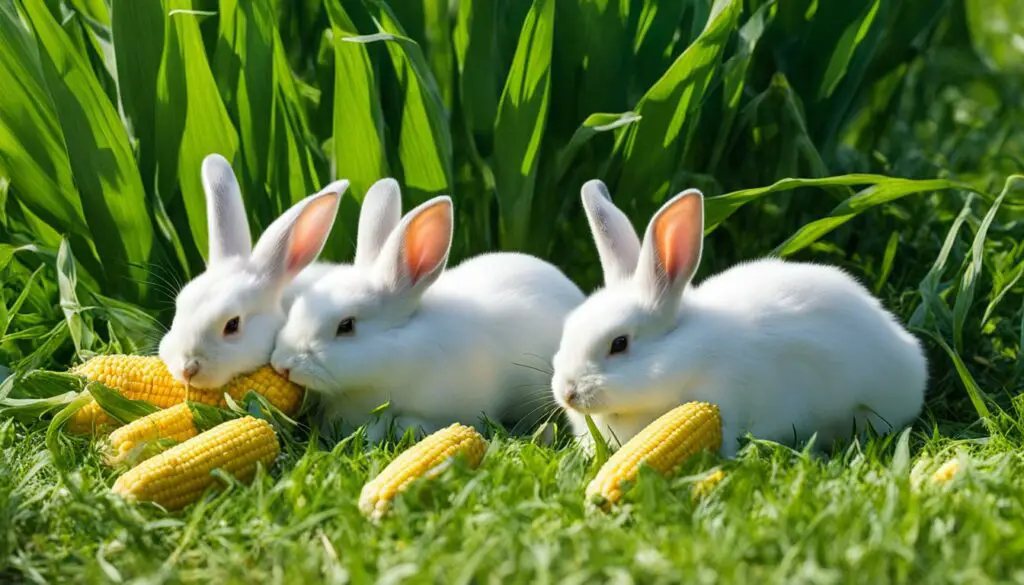
Remember that rabbits have specific dietary needs, and their digestive systems are sensitive. While it may be tempting to share your favorite snacks with them, like popcorn, it’s essential to resist the urge and make choices that promote their well-being. By following a balanced diet plan and avoiding foods like corn and popcorn, you can help ensure the health and happiness of your beloved pet rabbits.
Corn Husks and Rabbits
When it comes to feeding rabbits, it’s important to provide them with a variety of safe vegetables to ensure a balanced diet. While corn kernels and popcorn are not suitable for rabbits due to their high starch and sugar content, corn husks can be offered in moderation. Corn husks are actually a good source of fiber, which is beneficial for a rabbit’s digestive system. However, it’s essential to wash the husks thoroughly to remove any harmful chemicals or pesticides that may be present.
Aside from corn husks, corn leaves and stalks can also be given to rabbits during the corn season. These parts of the corn plant also contain fiber and can provide some variation in their diet. Just like with the husks, it’s important to ensure that the leaves and stalks are clean and free from any pesticides or contaminants.
Remember to introduce new vegetables gradually to rabbits and observe their reaction. If you notice any signs of digestive upset or discomfort, it’s best to remove the corn husks, leaves, or stalks from their diet. Always consult with a veterinarian for specific dietary recommendations for your pet rabbit.
| Safe Vegetables for Rabbits | Quantity |
|---|---|
| Bell Peppers | 1-2 tablespoons |
| Bok Choy | 1-2 tablespoons |
| Brussels Sprouts | 1-2 tablespoons |
| Cilantro | 1-2 tablespoons |
| Endive | 1-2 tablespoons |
| Green Leaf Lettuce | 1-2 tablespoons |
| Parsley | 1-2 tablespoons |
| Red Leaf Lettuce | 1-2 tablespoons |
By offering a variety of safe vegetables, including corn husks and other suitable options, you can ensure that your rabbit’s diet is nutritionally balanced and promotes their overall wellbeing.
Creating a Balanced Diet for Rabbits
When it comes to providing your pet rabbit with a healthy diet, it’s important to understand their nutritional needs. A balanced diet is crucial for rabbits to maintain their overall health and wellbeing. Here are some key factors to consider when creating a well-rounded diet for your furry friend.
Hay: The Foundation of the Diet
Hay should make up the majority of a rabbit’s daily food intake. Choose high-quality hay such as Timothy or orchard grass, as it provides essential fiber that aids in digestion and keeps their teeth in good condition. Make sure fresh hay is always available for your rabbit to eat throughout the day. The fiber in hay helps prevent various gastrointestinal issues like hairballs and keeps their digestive system functioning properly.
Vegetables: A Nutrient-Rich Addition
Introduce a variety of fresh vegetables into your rabbit’s diet to provide them with essential vitamins and minerals. Some safe vegetables for rabbits include bell peppers, bok choy, Brussels sprouts, cilantro, endive, green leaf lettuce, parsley, and red leaf lettuce. Remember to introduce new vegetables gradually and wash them thoroughly before feeding them to your rabbit.
Fruits: Treats in Moderation
While fruits can be a tasty treat for rabbits, they should be given in moderation due to their high sugar content. Offer small amounts of rabbit-safe fruits like apples, bananas, blueberries, cherries, mangoes, and peaches. Limit fruit intake to one to two tablespoons per day to prevent weight gain and maintain a balanced diet.
Pellets: Supplemental Nutrition
High-quality pellets can be included in your rabbit’s diet, but they should only be given in small amounts. Look for pellets that are specifically formulated for rabbits and avoid those with added sugars and fillers. Pellets should not replace hay or fresh vegetables but can serve as a supplemental source of essential nutrients.
Remember to always provide fresh water for your rabbit and ensure their living environment is clean and comfortable. It’s also crucial to consult with a veterinarian to determine the specific dietary needs of your pet rabbit based on their age, weight, and overall health.
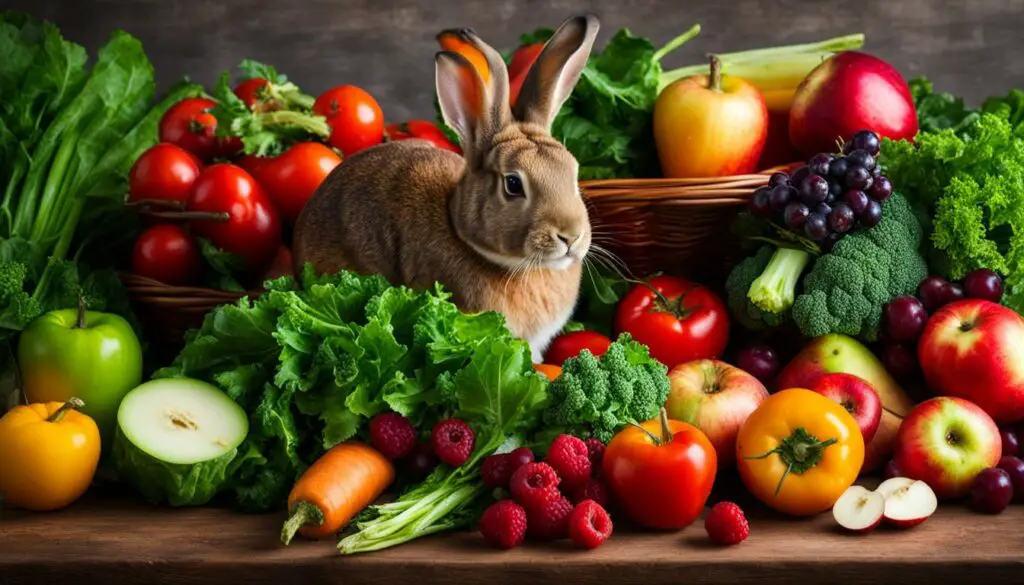
The Importance of Hay in a Rabbit’s Diet
When it comes to the diet of rabbits, hay plays a crucial role in ensuring their overall health and wellbeing. Hay, such as Timothy or orchard grass, should make up the majority of a rabbit’s daily food intake. It is a vital source of fiber that helps support a healthy digestive system and prevents the formation of hairballs. Additionally, hay helps to wear down a rabbit’s teeth, which continuously grow throughout their lives.
Feeding habits of rabbits have evolved to include a constant need for fiber, and hay provides the necessary roughage to facilitate proper digestion. The high fiber content in hay helps maintain a healthy gut by promoting good bacteria and preventing issues such as gastrointestinal stasis. It also aids in preventing obesity as rabbits naturally graze on hay throughout the day, promoting a slow and steady intake of nutrients.
To ensure rabbits receive an adequate amount of hay, it should be made available to them at all times. Place hay in a hay rack or feeder to keep it clean and easily accessible. High-quality hay that is dust-free and free from mold should be used to avoid any respiratory or health issues in rabbits. By prioritizing hay in a rabbit’s diet, owners can promote their overall health and provide a foundation for a balanced and nutritious eating plan.
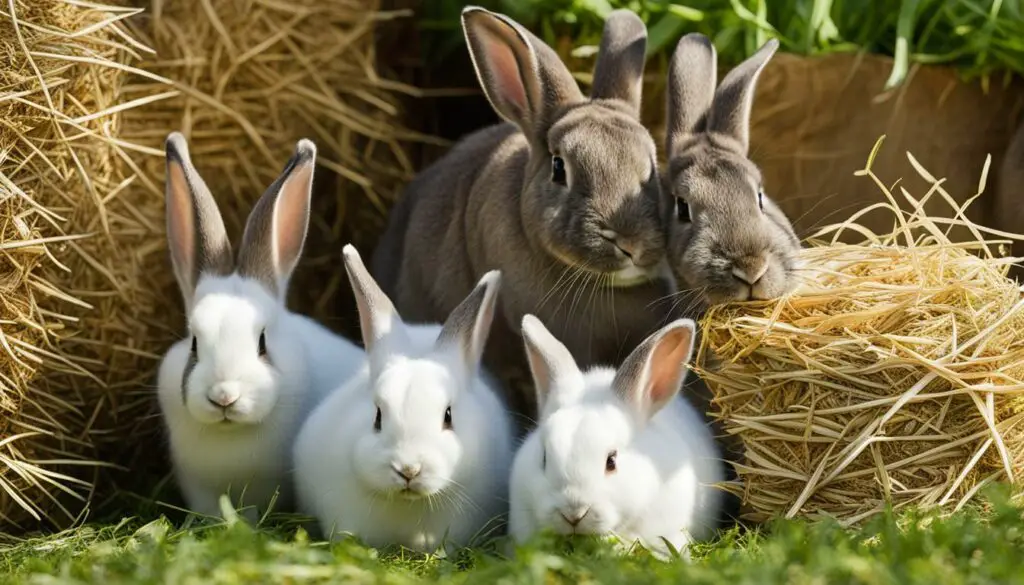
Types of Hay for Rabbits
| Type of Hay | Description |
|---|---|
| Timothy Hay | High in fiber, low in calcium, suitable for all ages of rabbits. |
| Orchard Grass | Similar to Timothy hay, a good alternative for rabbits with Timothy allergies. |
| Brome Hay | Soft and fragrant, ideal for young, senior, or picky eaters. |
| Oat Hay | Rich in fiber and protein, can be given as a treat or occasional feed. |
Safe Vegetables for Rabbits
When it comes to providing a healthy diet for your rabbit, incorporating a variety of safe vegetables is essential. Vegetables not only offer important nutrients but also add diversity to your rabbit’s meals. Here are some safe vegetables that you can introduce to your bunny’s diet:
- Bell Peppers
- Bok Choy
- Brussels Sprouts
- Cilantro
- Endive
- Green Leaf Lettuce
- Parsley
- Red Leaf Lettuce
These vegetables provide a range of vitamins and minerals that contribute to your rabbit’s overall health. It’s important to introduce new vegetables gradually, starting with small amounts and observing how your rabbit reacts to them. Wash the vegetables thoroughly to remove any pesticides or chemicals before offering them to your bunny. Remember to always consult with a veterinarian to ensure that your rabbit’s diet is well-balanced and appropriate for their specific needs.
Serving Vegetables to Your Rabbit
When serving vegetables to your rabbit, make sure to cut them into bite-sized pieces. This will prevent your bunny from choking and make it easier for them to eat. Offer a variety of vegetables each day to provide a diverse range of nutrients. Remember that vegetables should make up about 15-20% of your rabbit’s daily diet, with the majority being high-quality hay. Along with vegetables, hay, fresh water, and a limited amount of pellets, your rabbit will receive the nutrients they need to thrive.
| Vegetable | Nutritional Benefits | Serving Size |
|---|---|---|
| Bell Peppers | Rich in vitamin C and antioxidants | 1-2 thin slices |
| Bok Choy | High in vitamin A, C, and calcium | Small handful of leaves |
| Brussels Sprouts | Good source of fiber and vitamin C | 1-2 sprouts |
| Cilantro | Contains antioxidants and supports digestion | A few sprigs |
| Endive | Low in calories and high in fiber | 2-3 leaves |
| Green Leaf Lettuce | Provides vitamins A, C, and K | A handful of leaves |
| Parsley | Rich in vitamin C and supports dental health | A few sprigs |
| Red Leaf Lettuce | High in fiber and provides vitamins A and K | A handful of leaves |
By incorporating safe vegetables into your rabbit’s diet, you can provide them with a nutritionally balanced and enjoyable meal plan. Remember to introduce new vegetables gradually, wash them thoroughly, and consult with a veterinarian for personalized dietary recommendations for your furry friend.
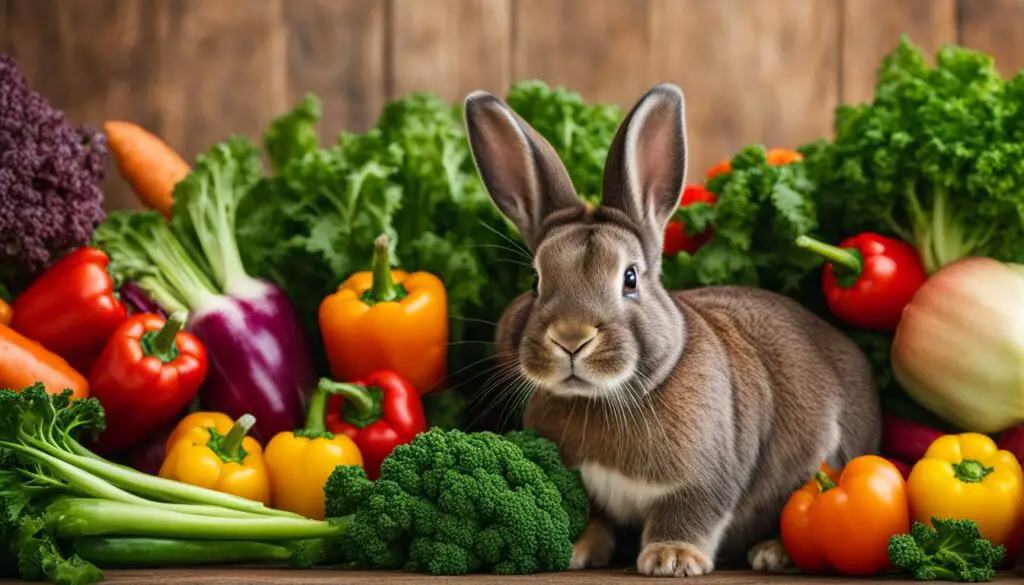
Nourishing Fruits for Rabbits
Rabbits can enjoy a variety of fruits as part of their diet. However, it’s important to remember that fruits should be given in moderation due to their high sugar content. Too much sugar can lead to obesity and other health issues in rabbits. As a responsible rabbit owner, it’s crucial to provide a balanced and nutritious diet for your furry friend.
Here is a list of safe fruits that you can offer to your rabbit:
- Apples
- Bananas
- Blueberries
- Cherries
- Mangoes
- Peaches
When giving fruits to your rabbit, it’s important to remember the 1 to 2 tablespoon rule. This means that you should only give one to two tablespoons of fruit per day to your rabbit. This small amount ensures that your rabbit gets a taste of their favorite fruits without consuming excessive sugar.
To create a visually engaging comparison, here’s a table that compares the sugar content of different fruits:
| Fruit | Sugar Content per 100g |
|---|---|
| Apple | 10g |
| Banana | 17.2g |
| Blueberries | 9.96g |
| Cherries | 12.8g |
| Mangoes | 14.98g |
| Peaches | 8.39g |
Remember, fruits should be just a small part of your rabbit’s overall diet. Hay, fresh vegetables, and limited pellets should make up the majority of their daily intake. Always consult with a veterinarian for specific dietary recommendations for your pet rabbit.
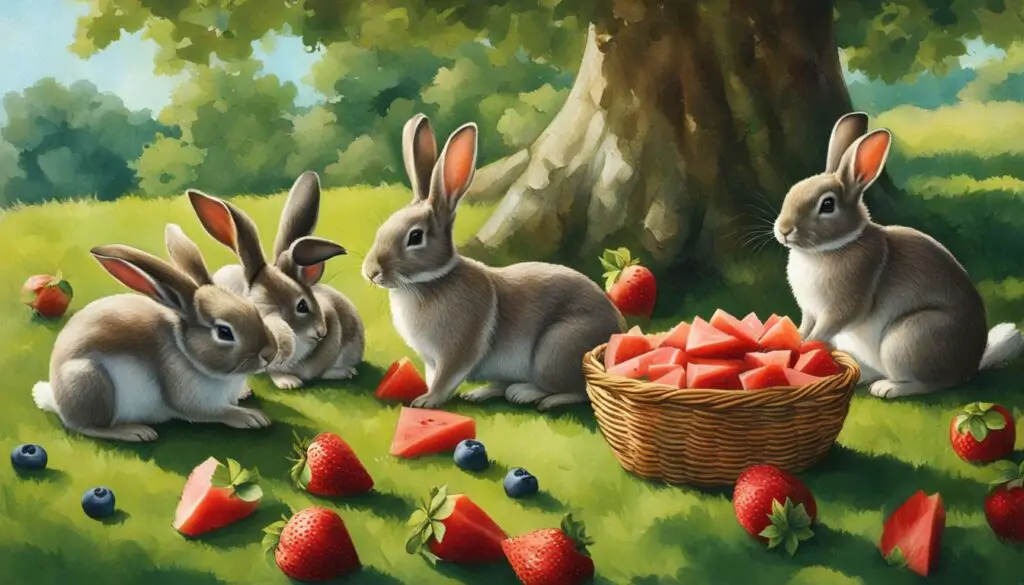
Rabbit Diet: The Role of Pellets in Balanced Nutrition
When it comes to providing a balanced diet for pet rabbits, pellets can play a role in ensuring they receive the necessary nutrients. While hay and fresh vegetables should be the main components of a rabbit’s diet, pellets can provide additional nutritional support. However, it’s important to use pellets as a supplement rather than a primary food source for rabbits.
Pellets for Nutritional Balance
Pellets formulated specifically for rabbits are designed to provide a balanced mix of nutrients, including essential vitamins and minerals. These pellets can be a convenient way to ensure that rabbits receive all the necessary nutrients for optimal health. However, it’s important to choose high-quality pellets that don’t contain excessive amounts of fillers, sugars, or unnecessary additives.
Portion Control and Moderation
While pellets can provide necessary nutrients, it’s crucial not to overfeed rabbits with them. Pellets should only make up a small portion of a rabbit’s daily diet, typically no more than 5-10% of their food intake. This allows rabbits to prioritize hay and fresh vegetables, which are crucial for their overall well-being. Overfeeding with pellets can lead to obesity and other health issues.
Consulting a Veterinarian
Every rabbit is unique, and their dietary needs may vary depending on factors such as age, breed, and overall health. It’s always advisable to consult with a veterinarian to determine the ideal pellet brand and portion size for your specific rabbit. A vet can assess your rabbit’s overall health and provide personalized dietary recommendations to ensure they receive the best possible nutrition.
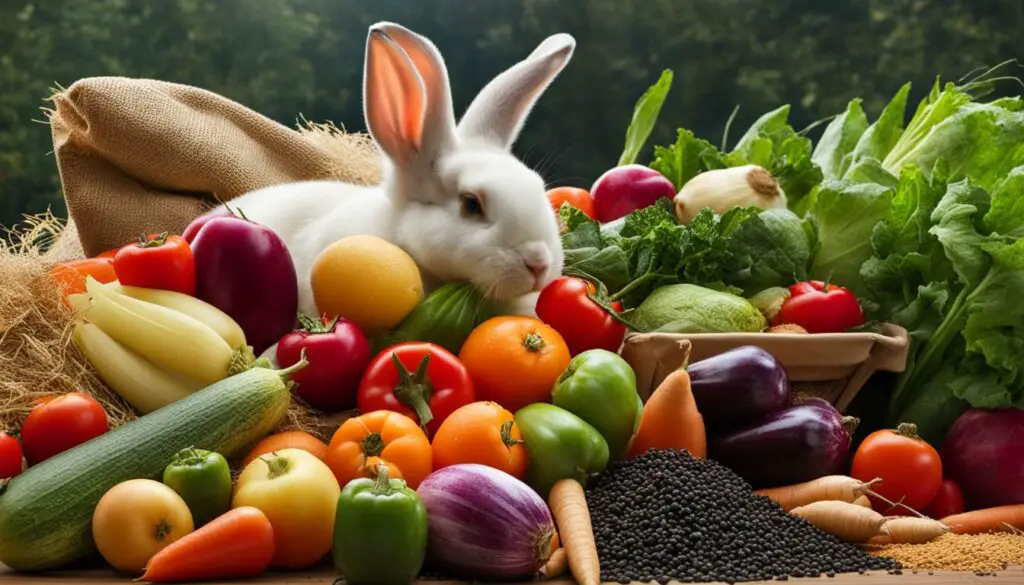
Pellet Comparison: Key Nutrient Analysis
| Pellet Brand | Protein Content | Fiber Content | Fat Content |
|---|---|---|---|
| Brand A | 16% | 20% | 3% |
| Brand B | 14% | 18% | 5% |
| Brand C | 18% | 22% | 4% |
Table: A comparison of key nutrients in different pellet brands. Protein content, fiber content, and fat content should all be considered when choosing the most suitable pellets for your rabbit.
Providing Fresh Water
Water is an essential element of a rabbit’s diet and should always be available to them. Clean and fresh water helps maintain their hydration and supports proper digestion. Rabbits are prone to dehydration, so it is crucial to provide them with a sufficient supply of water at all times.
There are two common methods for supplying water to rabbits – water bowls and water bottles. Both options have their advantages and disadvantages, so it’s essential to choose the one that works best for you and your rabbit.
If you opt for a water bowl, make sure it is heavy and sturdy to prevent tipping. Also, regularly check and clean the bowl to remove any debris or contaminants. On the other hand, water bottles are designed to prevent spillage and keep the water clean. Ensure that the bottle is securely attached to the side of the cage or enclosure at an appropriate height for your rabbit to access easily.
Rabbits can be messy drinkers, so it’s important to monitor the water supply regularly and refill as needed. If you notice any changes in your rabbit’s water consumption or if they suddenly stop drinking water, consult a veterinarian as it may indicate an underlying health issue. Remember, providing fresh and clean water is vital for your rabbit’s overall health and well-being.
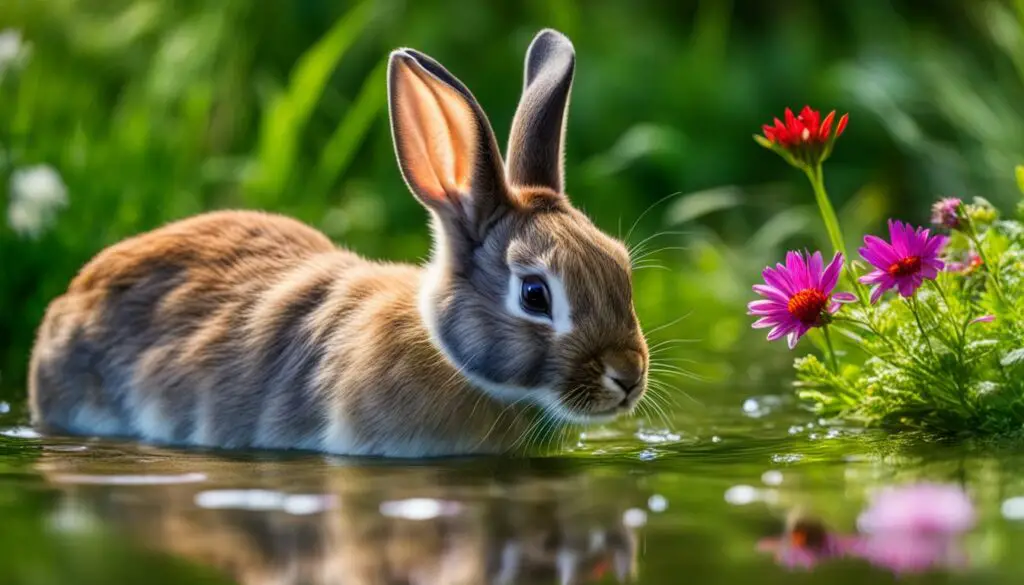
Potential Risks of Feeding Corn to Rabbits
Feeding corn to rabbits can have various negative consequences on their health and well-being. As mentioned earlier, rabbits are unable to digest grains like corn properly, which can lead to serious digestive issues. Additionally, the high starch content in corn can contribute to obesity in rabbits, as well as increase the risk of diabetes. The sugar content in corn also poses a threat to their dental health.
It is important to note that corn lacks the essential nutrients that rabbits require for their overall nutrition. While corn may be high in fiber and contain certain vitamins and minerals, it does not offer a well-rounded balance of nutrients necessary for their optimal health. Vets strongly discourage feeding corn to rabbits due to its potential to cause gastrointestinal problems and other health complications.
To prioritize the health and well-being of rabbits, it is crucial to opt for nutritionally balanced alternatives to corn. A diet consisting of high-quality hay, fresh vegetables, a limited amount of pellets, and the occasional safe fruits is key to providing rabbits with the necessary nutrients they need. Consult a veterinarian for specific dietary recommendations tailored to your pet rabbit’s needs.
| Potential Risks of Feeding Corn to Rabbits |
|---|
| Digestive issues |
| Obesity |
| Increased risk of diabetes |
| Dental problems |
| Lack of essential nutrients |
| Gastrointestinal problems |
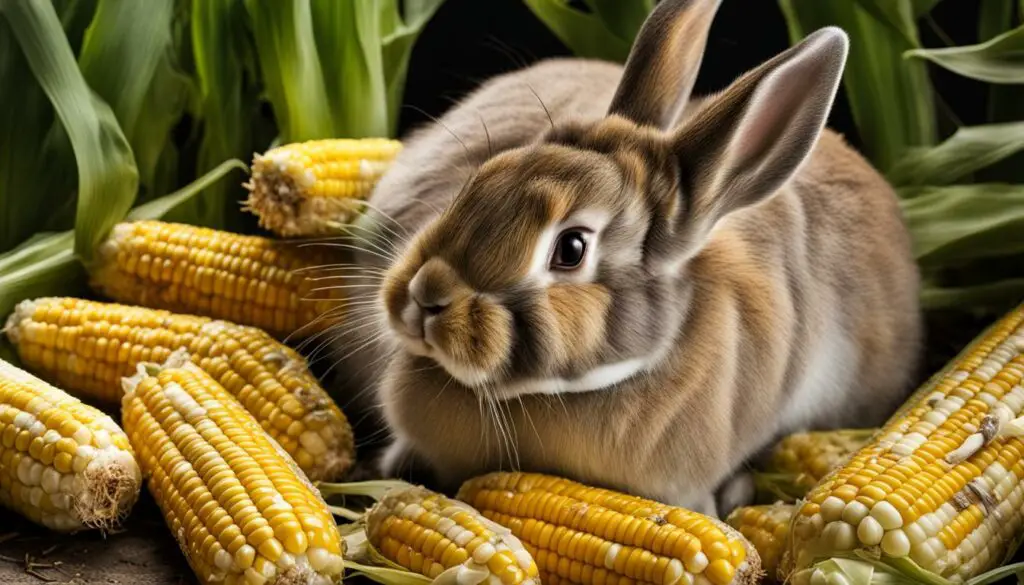
Monitoring Corn Consumption in Rabbits
Feeding corn to domestic rabbits can have negative effects on their health. If your rabbit has consumed corn, it is important to monitor them closely for any signs of discomfort or digestive issues. Bloating, diarrhea, and vomiting are potential symptoms that may indicate a problem. Pay attention to the amount of corn consumed by your rabbit, as excessive intake can lead to serious health risks.
To support digestion and alleviate any potential issues, provide plenty of fresh water and hay to your rabbit. Water helps flush out toxins and keeps the digestive system functioning properly. Hay, on the other hand, provides essential fiber that aids in digestion and prevents blockages. Be sure to offer high-quality hay such as Timothy or orchard grass, as these options are best suited for rabbits’ dietary needs.
While monitoring your rabbit, observe their behavior and overall well-being. If you notice any concerning symptoms or changes in their eating or elimination habits, it is recommended to consult with a veterinarian. They can provide further guidance and advice based on your rabbit’s specific needs and circumstances. Remember, prioritizing your rabbit’s health and providing a balanced, nutritious diet is essential for their overall well-being.
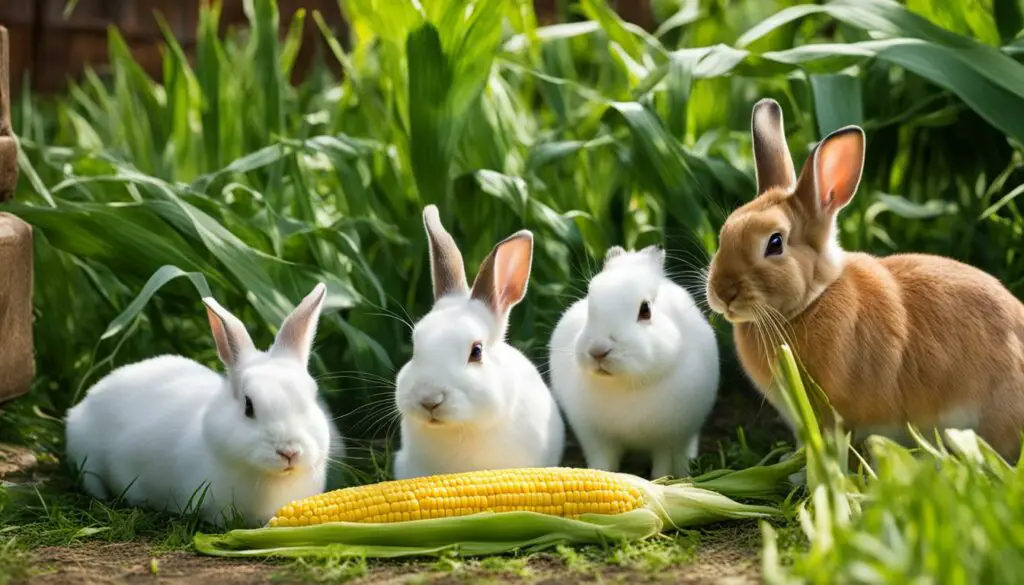
Table: Potential Signs of Discomfort in Rabbits
| Signs of Discomfort | Possible Causes |
|---|---|
| Bloating | Difficulty digesting corn |
| Diarrhea | Upset stomach due to corn consumption |
| Vomiting | Rejection of corn by the digestive system |
Importance of a Balanced Diet for Rabbits
A balanced diet is crucial for the health and wellbeing of rabbits. Providing the right combination of nutrients ensures that rabbits receive the essential elements they need to thrive. A well-rounded diet consisting of hay, fresh vegetables, fruits, and limited pellets supports optimal rabbit health and helps prevent nutritional deficiencies.
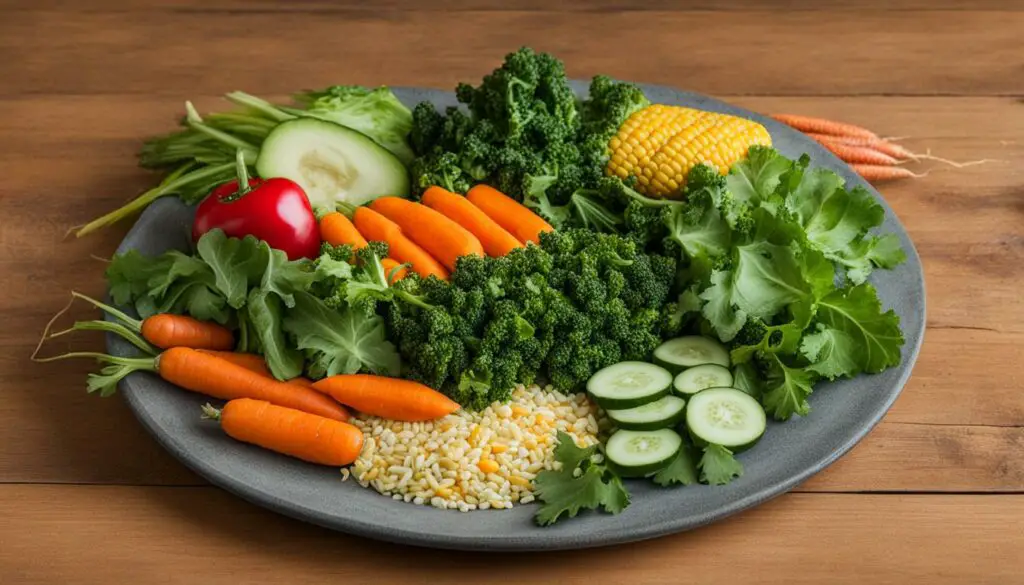
Hay should be the staple food in a rabbit’s diet as it provides essential fiber that aids in digestion and prevents hairball formation. Choose high-quality hay such as Timothy or orchard grass and ensure it is available to your rabbit at all times. Fresh vegetables are also important and should be introduced gradually. Safe options include bell peppers, bok choy, Brussels sprouts, cilantro, endive, green leaf lettuce, parsley, and red leaf lettuce. These vegetables provide additional vitamins and minerals that rabbits need.
Fruits can be given as occasional treats, but they should be offered in moderation due to their high sugar content. Apples, bananas, blueberries, cherries, mangoes, and peaches are all suitable options. Pellets can supplement a rabbit’s diet, but they should be given sparingly and should not replace hay or fresh vegetables. It’s important to choose high-quality pellets that are specifically formulated for rabbits.
The Benefits of a Balanced Diet for Rabbits
A balanced diet supports a rabbit’s overall health and wellbeing in several ways. It helps maintain a healthy digestive system, prevents obesity, and supports proper dental health. The fiber from hay aids in digestion and helps prevent gastrointestinal issues, while the chewing action required to eat hay promotes dental wear, preventing dental problems that can arise from overgrown teeth. Providing a variety of vegetables and fruits ensures that rabbits receive a range of vitamins and minerals that are essential for their wellbeing.
By following a balanced diet, rabbits are more likely to maintain a healthy weight, have a shiny coat, and exhibit good energy levels. It is important to consult with a veterinarian for specific dietary recommendations based on your rabbit’s age, size, and individual needs. A well-informed and attentive approach to their diet will help ensure that rabbits live long, happy, and healthy lives.
Rabbit Diet Guide: Can Bunnies Eat Corn?
When it comes to feeding rabbits, it’s essential to provide them with a balanced diet that meets their nutritional needs. While corn may seem like a tempting treat, it is not suitable for rabbits and can pose health risks. Rabbits have difficulty digesting grains like corn, which can lead to choking hazards and digestive issues.
Corn lacks the necessary nutrients that rabbits require for optimal health. It is high in starch, potassium, and sugar, which can contribute to obesity, diabetes, and dental problems in rabbits. Feeding corn to rabbits can have detrimental effects on their overall well-being.
To ensure the health of your pet rabbit, it is best to prioritize their diet with nutritionally balanced alternatives. A rabbit’s diet should consist of hay, fresh vegetables, fruits, and limited pellets. Hay, such as Timothy or orchard grass, is essential for their digestive health and should make up the majority of their diet. Fresh water should always be available to keep them hydrated. Consulting with a veterinarian is always recommended to ensure you are providing the best diet for your pet rabbit.
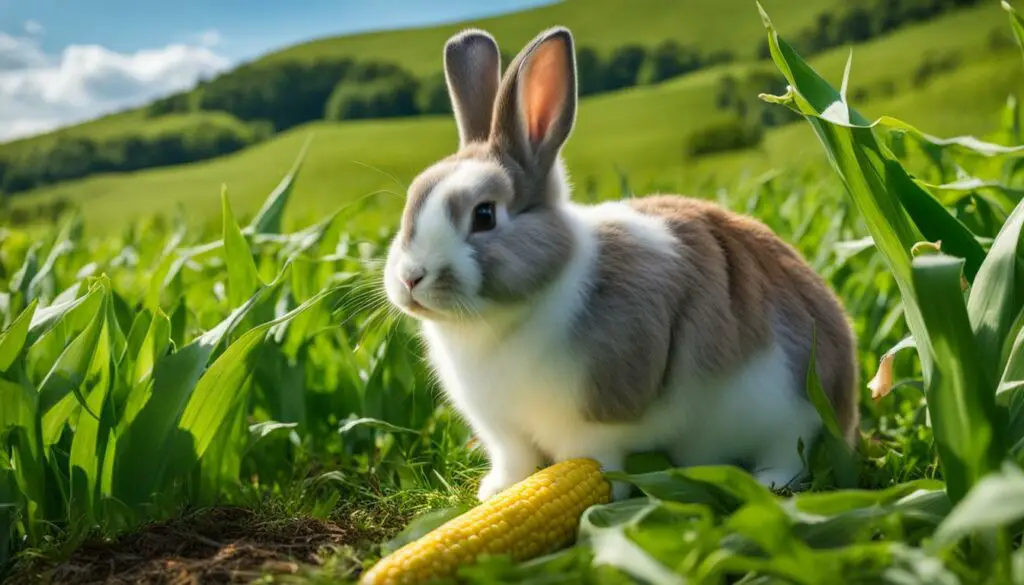
Rabbit Diet Guide: Can Bunnies Eat Corn?
When it comes to feeding rabbits, it’s essential to provide them with a balanced diet that meets their nutritional needs. While corn may seem like a tempting treat, it is not suitable for rabbits and can pose health risks. Rabbits have difficulty digesting grains like corn, which can lead to choking hazards and digestive issues.
Corn lacks the necessary nutrients that rabbits require for optimal health. It is high in starch, potassium, and sugar, which can contribute to obesity, diabetes, and dental problems in rabbits. Feeding corn to rabbits can have detrimental effects on their overall well-being.
To ensure the health of your pet rabbit, it is best to prioritize their diet with nutritionally balanced alternatives. A rabbit’s diet should consist of hay, fresh vegetables, fruits, and limited pellets. Hay, such as Timothy or orchard grass, is essential for their digestive health and should make up the majority of their diet. Fresh water should always be available to keep them hydrated. Consulting with a veterinarian is always recommended to ensure you are providing the best diet for your pet rabbit.
Summary:
- Corn is not suitable for rabbits as they struggle to digest grains like corn properly.
- Feeding corn to rabbits can lead to health risks such as choking hazards and digestive issues.
- Corn lacks essential nutrients and has a high starch, potassium, and sugar content.
- A balanced rabbit diet should consist of hay, fresh vegetables, fruits, and limited pellets.
Additional Resources
I understand that providing the best care for your beloved rabbit is a top priority, which is why I’ve compiled some valuable resources to further assist you in ensuring their health and well-being. Below you will find a list of rabbit diet resources and rabbit health information that can help you make informed decisions about their nutrition.
Rabbit Diet Resources:
If you’re looking for comprehensive guides on rabbit nutrition, the following resources are highly recommended:
- The Bunny Diet Handbook – A detailed guide covering everything you need to know about creating a well-balanced diet for your rabbit.
- Rabbit Nutrition 101: A Beginner’s Guide – A beginner-friendly resource that provides a solid foundation for understanding rabbit nutrition and dietary needs.
- Feeding Your Rabbit: Dos and Don’ts – An informative article that highlights common mistakes to avoid when it comes to feeding your rabbit.
Rabbit Health Information:
When it comes to the health of your rabbit, it’s essential to stay informed. These resources offer valuable insights into maintaining your rabbit’s well-being:
- Rabbit Health and Wellness: A Comprehensive Guide – An extensive resource covering various aspects of rabbit health, including common health issues, preventive care, and first aid tips.
- Understanding Rabbit Digestive System – Dive into the intricacies of a rabbit’s digestive system, and discover how to promote optimal digestion and prevent digestive problems.
- Rabbit Physical Fitness: Exercise and Enrichment – Learn about the importance of exercise and mental stimulation for rabbits, and discover fun ways to keep your furry friend active and happy.
By utilizing these resources, you can ensure that you have the knowledge and understanding necessary to provide the best care for your rabbit. Remember, always consult with a veterinarian for personalized advice and guidance based on your rabbit’s specific needs.
FAQ
Can bunnies eat corn?
No, corn is not a suitable treat for rabbits as they cannot digest grains like corn properly. Feeding corn to rabbits can lead to health risks such as choking hazards and digestive issues.
Why is corn not suitable for rabbits?
Corn lacks the necessary nutrients rabbits require and has a high starch, potassium, and sugar content. Feeding corn can lead to obesity, diabetes, and dental problems in rabbits.
Can rabbits eat popcorn?
No, popcorn is also not a suitable snack for rabbits. It is difficult for them to digest and often contains salts, sugar, and other ingredients that are not suitable for their diet.
Can rabbits eat corn husks?
Corn husks can be offered in moderation as they contain fiber, which is beneficial for rabbits. However, it is important to wash the husks thoroughly to remove any harmful chemicals or pesticides.
What should be included in a rabbit’s diet?
A rabbit’s diet should consist of hay, fresh vegetables, and a limited number of pellets. Hay, such as Timothy or orchard grass, should make up the majority of their diet.
Which vegetables are safe for rabbits?
Safe vegetables for rabbits include bell peppers, bok choy, Brussels sprouts, cilantro, endive, green leaf lettuce, parsley, and red leaf lettuce.
Can rabbits eat fruits?
Yes, rabbits can enjoy fruits in moderation. Apples, bananas, blueberries, cherries, mangoes, and peaches are some fruits that can be offered to rabbits.
Are pellets necessary for rabbits?
Pellets can be a part of a rabbit’s diet, but they should be given in limited amounts. High-quality pellets specifically formulated for rabbits should not replace hay or fresh vegetables in their diet.
How important is hay in a rabbit’s diet?
Hay is the most important part of a rabbit’s diet as it provides essential fiber. It helps maintain a healthy digestive system and prevents hairballs.
How much water should rabbits have?
Clean, fresh water should always be available to rabbits. Water bowls or bottles can be used to supply water, but they should be cleaned regularly to prevent bacteria growth.
What are the potential risks of feeding corn to rabbits?
Feeding corn to rabbits can lead to serious health risks, including digestive issues, obesity, and dental problems. The high starch content and lack of essential nutrients make corn an unsuitable food choice for rabbits.
How should I monitor corn consumption in rabbits?
If a rabbit has consumed corn, it is important to monitor them for any signs of discomfort, such as bloating, diarrhea, or vomiting. Providing plenty of fresh water and hay can support digestion.
Why is a balanced diet important for rabbits?
A balanced diet is crucial for the health and wellbeing of rabbits. It ensures they receive all the necessary nutrients for optimal health and prevents health issues associated with improper nutrition.
Are there any additional resources about rabbit nutrition and health?
Yes, here are some additional resources that can provide further information about rabbit nutrition and health:
– [Resource 1 Title](Link to Resource 1)
– [Resource 2 Title](Link to Resource 2)
– [Resource 3 Title](Link to Resource 3)

